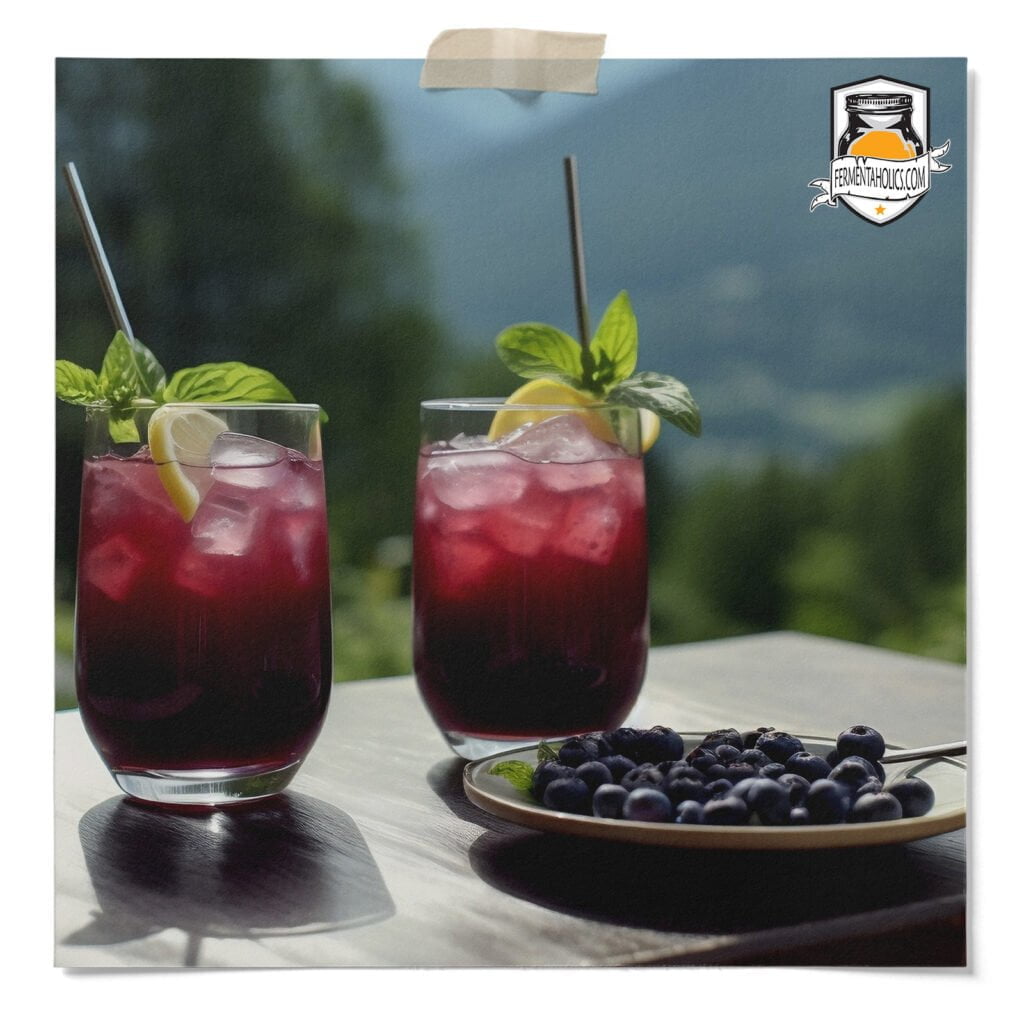
Basil and ginger make a great supporting team to bring out the best blueberries have to offer. The basil adds in a dimension of depth while the ginger spices it up. These flavors aren’t only added to mask the vinegary kombucha, but rather to complement it. Much like vinegar in a vinaigrette, the kombucha adds a brightness where it would otherwise fall flat. The blueberries’ flavor becomes amplified yet somehow remains subtle. Together they make a great team. Want to give this recipe a try? Brew kombucha like you would normally, allowing it to go the full fermentation. You can either brew traditional kombucha with the instructions on how to make kombucha here, or jun kombucha with instructions on how to make jun kombucha here. Traditional kombucha is going to yield a bolder brew, while jun kombucha is milder.
It’s important to note that making homemade kombucha is almost always a two-step fermentation process. Brewing kombucha is only a one-step process for those who prefer an unflavored flat kombucha. Otherwise, the steps consist of a primary fermentation and a secondary fermentation.
Primary fermentation is the first step of the kombucha brewing process. This is where your SCOBY transforms regular sweet tea into the tart and slightly sweet kombucha we love. At the end of this stage, you will have finished kombucha, but it will be flat and unflavored. Have you skipped this step? Then check out our guide on how to make kombucha at home, and for jun kombucha, see our post on how to make jun kombucha tea at home. Traditional kombucha is going to yield a bolder brew, while jun kombucha is milder and can be a bit tarter.
Secondary fermentation is the step where you bottle, carbonate, and flavor your kombucha with the addition of sugar and flavors. In this step, the finished kombucha from the primary is mixed with sugar, fruits, or other flavors before bottling it with specialized lids that can hold pressure, like flip-top bottles. The bottled kombucha is then left at room temperature for natural fermentation, where yeast carbonates the kombucha within the sealed bottle. The ideal temperature range for this process is between 75-85°F. The amount of time needed to carbonate within the bottle is highly tied to temperature, which can take anywhere from 2-10 days.
💡Since this recipe is for the secondary fermentation, to make this recipe, you’ll need to have kombucha that has finished the primary fermentation and is ready to bottle.
This recipe makes one 16-fluid-ounce bottle. A 1-gallon batch of kombucha will make seven 16-ounce bottles, so for one gallon, you will need to multiply the ingredients by 7. Before beginning this recipe, you will need to:
16 FL Oz Bottles
10
Minutes2-10 Days
This Komblueberry Bliss kombucha recipe is for one 16 fluid ounce bottle. For a gallon batch, make seven bottles. To scale this recipe to a gallon batch, multiply the ingredients by seven or toggle the serving size up to seven above. Before bottling your kombucha, remove the SCOBY pellicle along with 12-16 ounces of kombucha starter tea from your brew, and reserve for your next batch.
16 Oz Kombucha from a completed primary fermentation.
2-3 pieces Candied Ginger, diced (or 1 tbsp fresh ginger)
10-13 Blueberries Halved (thaw first if using frozen)
3-5 Leaves Fresh Basil
16 Oz Swing Top Bottles
Measuring Spoons
Add diced candied ginger to a clean, empty bottle.
Gently smash the blueberries and basil in a bowl before shoving them into bottles, along with the ginger.
Using a funnel, top bottle off with kombucha, leaving about 1 to 2 inches of head-space. Tightly place the caps on each bottle.
Keep bottles at room temperature for 2-10 days; it will carbonate faster at higher temperatures and slower when cold.
Burp the bottles as necessary to release excess pressure. This is done by removing the cap to allow built-up pressure to escape then placing the cap back on.
Chill in the refrigerator once you’re happy with the carbonation levels. Based on preference, you can serve as is or strain before drinking.
